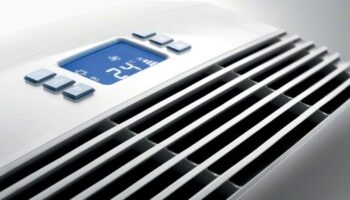We've independently reviewed this article to make sure it's as accurate as we can make it.
To find out more about our article creation and review process, check out our editorial guidelines.
Unsure about the differences between a portable AC vs a window AC?
Don’t worry, you’re not alone! Choosing the right air conditioner to stay cool during summer can be a bit challenging.
Luckily, you’ve come to the right place for answers.
A window air conditioner is a more efficient option compared to portable air conditioners, and they don’t take up as much floor space. However, window units are more hassle to install and are less mobile. Portable air conditioners can be moved between rooms depending on the time of day.
But there’s much more to it than that. Read on for detailed comparisons between portable vs window air conditioners.
Comparing Portable vs Window Air Conditioners
The best way to compare two similar appliances is to consider each aspect of owning them. Below I’ve compared all the main aspects that an air conditioner owner will be concerned with.
Try to consider which aspects will be most important for you – knowing which type is better will help you decide what suits you best.
For the aspects of noise, efficiency, and price, I’ve collected data from 24 different air conditioner models. These are some of the most popular portable and window air conditioners (12 of each) available on Amazon at the time of writing. Their power ranges are between 8,000 and 14,000 BTU. See the table of data taken at the end of this post.
#1 Noise
Comparing the data sets for both air conditioners, it appears clear that window air conditioners are typically noisier than portable versions for the same power ratings. These are slightly skewed by the highest readings for 8k, 10k, and 12k BTU models above 58 decibels.
In general, we can state that a portable air conditioner is quieter for the amount of cooling power compared to a window AC.
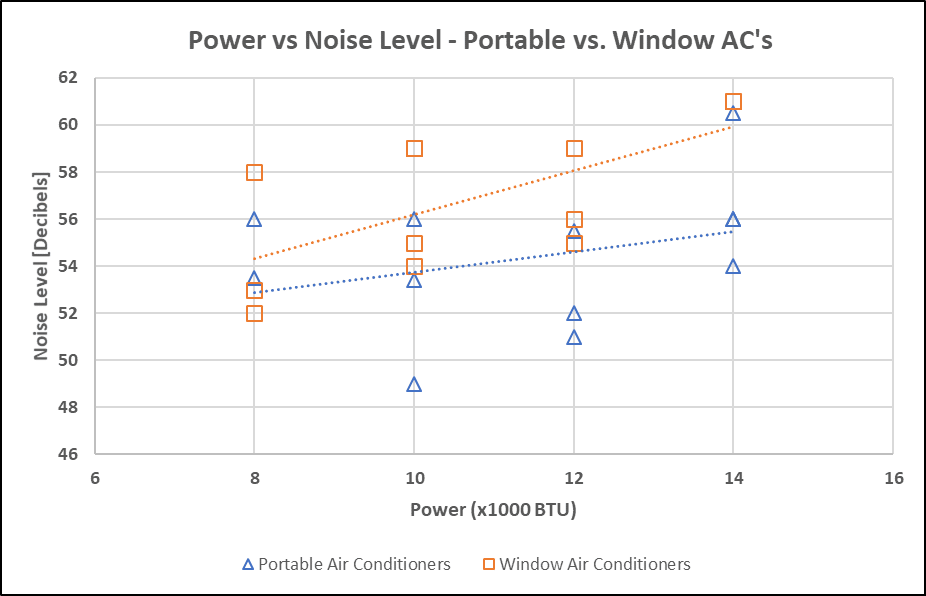
One note to keep in mind, however, is that you will hear a portable air conditioner more easily. Because it sits fully in the room with you, its noise will be closer and more apparent.
#2 Efficiency
Now, it’s time to compare portable vs window AC efficiency.
The best way to look at efficiency is the area covered by the power of an air conditioner. In the chart below, I’ve plotted the power (in BTU x1000) against the reported area covered.
We can see the window air conditioners all cover an equivalent area for their power (8k,10k,12k,14k BTU = 350, 450, 550, 700 sq. feet).
Alternatively, portable air conditioners are all over the place! Some appear to be incredibly inefficient, while a fair few match the same values reported by the window AC’s. I don’t personally know if there is a large issue with the way the manufacturers are reporting them (you would expect them to be at least similar).
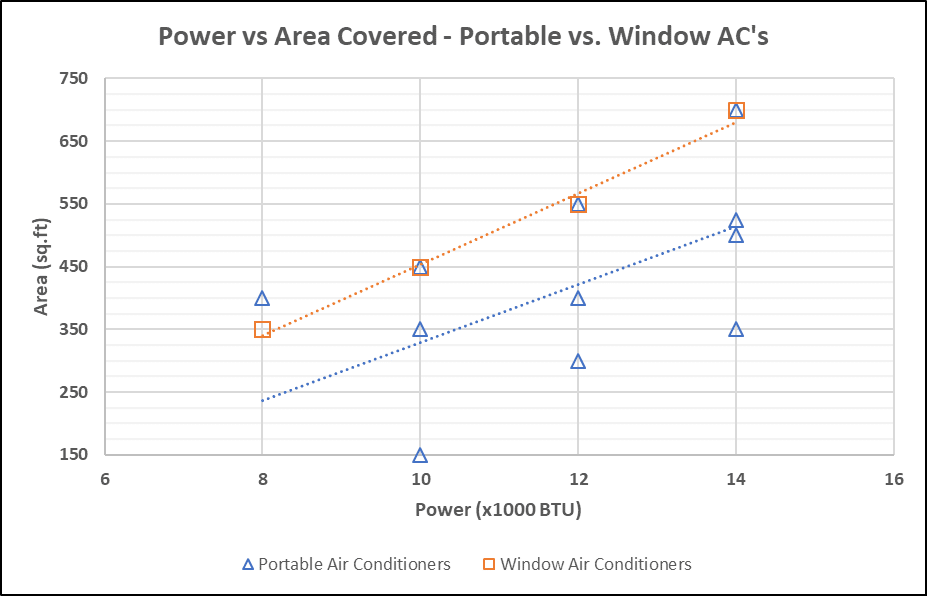
This does, at least, confirm the general rule that you need a more powerful portable air conditioner to cover the same area as a window air conditioner.
In other words, window air conditioners tend to be more efficient, per BTU, than portable air conditioners.
#3 Price
Comparing prices shows a clearly higher trend for window air conditioners than portable versions, for the same power.
This reflects the efficiency difference we saw above – a less powered window ac will cover the same area as most higher-powered portable ACs.
For all ranges, the difference tends to be around $75 between the two. Any window AC is priced approximately the same as a portable AC of the next power level.
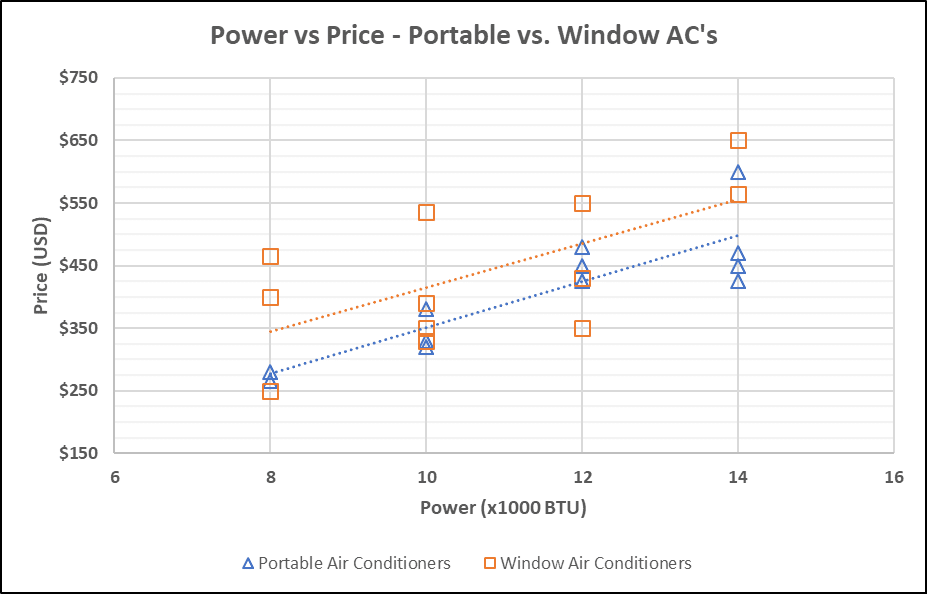
This roughly equates to paying the same coverage from an air conditioner.
#4 Portability
The winner when it comes to portability, obviously, are portable air conditioners. While a window ac needs a fair bit of work to install, a portable model just needs a quick ‘clip’ in of it’s exhaust to the window frame.
This makes portable models much more useful if you’ll need to use them in multiple rooms. While you can move a window AC around, it’s a lot more work and heavy lifting.
Some good uses for the mobility of a portable air conditioner are:
- Using it in the living room by day, and bedroom at night
- Changing rooms throughout the day to avoid the sun (i.e. keeping to shaded rooms)
- Focusing cooling on one area (having it close to where you sit)
#5 Looks
A major drawback to window air conditioners is how they look. On a sunny day, being able to appreciate it out of the window can be one of the best-looking parts of your room.
Putting a huge ‘block’ of an appliance in the first foot of that window can really have an effect on the lightness of space.
While some may say I’d be exaggerating, others would agree. In fact, some HOA’s ban the use of window units outright!
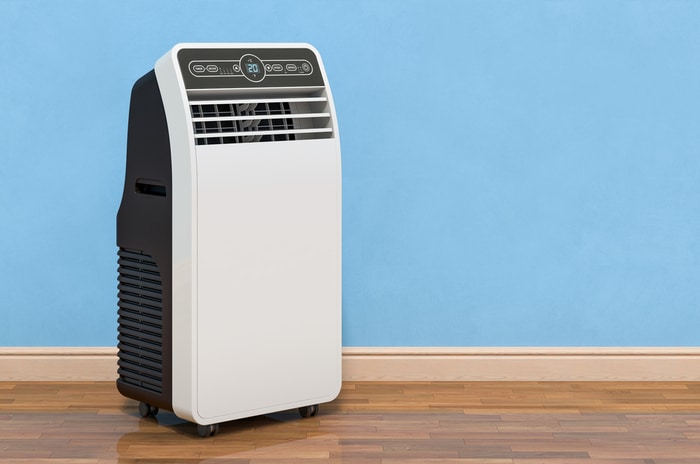
Alternatively, some portable air conditioners have a great modern design to them. While they do take up space, the right look can help make a room feel more modern and quality, as opposed to cluttered.
That said, we do need to consider…
#6 Floor Space
Considering that a window air conditioner doesn’t actually touch the floor – they’re the clear winners here!
A portable AC is no small appliance and takes up a fair chunk of floor space. This can be quite an issue in smaller rooms, but not a problem in larger ones. Especially if it can be placed somewhere convenient, or even hidden behind a couch.
Thankfully, a good portable AC also tends to look modern and high quality. This can help to bring a space together, and act as a feature of a room – rather than an annoyance!
The effect of this depends entirely on the room – just try to imagine where you would have the air conditioner, and whether you’d be comfortable with that.
#7 Installation Difficulty
I don’t know if you could even use the word ‘installation’ for a portable unit. It’s a simple case of wheel it in, clip in the window frame, and press ‘On’. While they’re bulky appliances to be pushing around, the setup is simple, quick, and easy for a portable unit.
On the other hand, window air conditioners aren’t exactly ‘light and fun’. They often weigh over 50lbs (22kg), need to be installed onto a small space (window frame), and need to be installed securely. This isn’t the easiest of tasks – especially if it’s your first time working with one.
You may want to consider an expert installation to make sure you have a window air conditioner installed correctly. Not to mention the sweat (but hopefully not tears!) that you would save.
If you’re installing it above the ground floor, you may be required to have it installed professionally. If you don’t own your own home, be sure to check with the building owner before you install a window air conditioner – some ban it outright due to safety concerns from unsecured units at height.
#8 How They Deal With Water
While both ac types use the same cooling system – there is one difference in how they work. That’s to do with water. As part of the cooling process, both types will slowly generate some water.
This happens as the warm air is cooled by the evaporator coil, which causes condensation. Just like the condensation on an ice-cold glass of water, this collects as drips. Just like the opposite of a swamp cooler.
Both air conditioner types collect this water in a drip tray. This water can then be used to cool the condenser by getting picked up by the fan. If the tray gets too full though? A portable air conditioner will need you to empty it or connect it to a water drain. A window air conditioner, on the other hand, can just let the water drip down outside. You don’t need to do anything.
#9 Exhaust Method
Both of these air conditioner types use the same systems to cool the air in our homes:
- They use what are called ‘refrigerants’ – chemicals that are made to go from liquid to gas quickly, and also do the reverse.
- These are passed through cooling coils and absorb heat from the air as they do so.
- As it takes in the heat, the liquid transitions into a gas.
- This is where the compressor kicks in, pressurizing the gas until the heat evacuates out the exhaust.
The difference between window and portable AC is the exhaust method. Simply put, a portable AC uses an exhaust vent that needs to be attached to a window frame to vent the hot air outside.
On the other hand, window air conditioners are already out the window! They can exhaust the hot air outside directly.
Portable AC vs Window AC: Pros & Cons
To help give a simple comparison, I’ve put together this table of pros and cons to give an overview of what’s better and worse between the two types. However, there’s plenty more to it than just these points! The sections compare the air conditioner types in more detail.
| Pros | Cons |
|---|---|
| Portable Air Conditioners | |
| Easy to Install - Set-up is just a quick clip-on window frame. | Generally Pricier - See the table later in this post. |
| Great Looks - Contemporary designs on recent models can make a room feel more modern. | Generally Louder - As above. |
| Highly Mobile - They do need a bit of a push, but these units are easy to move between rooms. | Less Efficient - The cause of the above two points. Typically require higher power for the same size of room. |
| Convenient Placement - Can be tucked away towards a corner or behind a couch, out of view. | |
| Window Air Conditioners | |
| Quiet - They're more difficult to hear in large rooms. | Effort to Install - Often weighing over 50lbs, they're not easy to securely mount onto a window frame. |
| Efficient - See the table later in this post. | Not Easy to Move - Once you've done the installation once, you probably won't be in a hurry to do it again! |
| Generally cheaper - As above. | Looks Bad/Blocks Window - There's no option but to have a big chunk of your window view (and light) blocked by the air conditioner. |
| Needs Permission - If you don't own your property, you may be at the mercy of the landlord/building owner regarding if you can install one or not. | |
When to Choose a Portable Air Conditioner
Portable ACs are perfect for those needing, you guessed it, portability! While a window air conditioner is essentially ‘stuck’ once it’s been installed, a portable unit can happily move around on its wheels.
This makes them ideal for anyone looking to cool more than one room. For example, cooling your living area in the day and the bedroom at night. The quick installation (just clipping in the window frame) is also much less of a worry when you pick it up.
Suitability is another reason to go portable. If your landlord or building owner might be funny about window air conditioners, they can’t complain about portable ones. Also, if you’re a renter, you won’t need to worry about bringing the air conditioner with you when you move.
Lastly, portable units are a great solution if the window you would use is in the sun. If the only windows you could use are directly in the sun, this makes puts a ton of extra load on them. Instead, keeping a portable unit inside in the shade can be much more efficient.
When to Choose a Window Air Conditioner
If you meet the right conditions, you can enjoy all the advantages of a window air conditioner. They’re more efficient and typically cheaper.
Those conditions for choosing a window AC are that you have a suitable window frame, a property you own (or a relaxed landlord), that the window doesn’t get too much sun, and that you can handle the installation (or hire an expert to do it).
If all of those apply to your space, then congratulations! Choose a window air conditioner for a quieter, cheaper, more efficient cooling solution. Just make sure you’re happy to only have the air conditioner in that one room.
Moving it around is possible, but trust me – after you’ve installed it once, you won’t be in a hurry to do it again.
Portable/Window Units vs. Central Air Conditioners
Portability is what defines both portable and window air conditioners. They can both be installed exactly where you need them. On the other hand, a central system is a magnitude more powerful, built to cool your whole home.
The great advantage of these singular, smaller units is that you only generate the cooling you need. They can save tons on your energy bills by only heating one area. As opposed to the high cost of cooling a whole home.
Alternatively, they can also supplement the cooling in one area if the summer temperature is getting unbearably hot!
Conclusion
These two types of air conditioners are extremely similar in a lot of ways. They work using the same system, they can be installed anywhere, and they’re perfect to help you save on energy bills by focusing cooling one room.
That said, as we’ve seen, there’s plenty of differences between them.
In short, the window air conditioner is the better option of the two. But it comes with a lot of drawbacks. While it may be quieter and more efficient, what’s the use if you still end up roasting hot in your bedroom at night, or frustrated at missing the first foot of your window!
It’s a case of choosing the window option if you can, but if you’re in doubt – go portable. It may be a bit noisier and pricier, but it can adapt to help you make the most out of having a mobile air conditioner.
Data Used
Below is the tabulated data taken from the 24 air conditioners reviewed for this guide. These were some of the most popular models available on Amazon at the time of writing.
| Brand | Price | Power | Noise | Area |
|---|---|---|---|---|
| [USD] | [1000BTU] | [Decibels] | [Sq. Ft] | |
| Portable Air Conditioners | ||||
| Midea | $280 | 8 | 53.5 | 100 |
| Midea | $320 | 10 | 53.4 | 150 |
| Midea | $450 | 12 | 55.5 | 300 |
| Midea | $470 | 14 | 60.5 | 350 |
| Whynter | $450 | 14 | 56 | 500 |
| Whynter | $425 | 12 | 52 | 400 |
| EdgeStar | $425 | 14 | 56 | 525 |
| SereneLife | $330 | 10 | 56 | 350 |
| Honeywell | $380 | 10 | 49 | 450 |
| Honeywell | $480 | 12 | 51 | 550 |
| Honeywell | $600 | 14 | 54 | 700 |
| Costway | $265 | 8 | 56 | 400 |
| Window Air Conditioners | ||||
| Frigidaire | $350 | 10 | 55 | 450 |
| Keystone | $465 | 8 | 52 | 350 |
| Keystone | $535 | 10 | 54 | 450 |
| Keystone | $550 | 12 | 56 | 550 |
| Keystone | $565 | 14 | 61 | 700 |
| Emerson | $250 | 8 | 53 | 350 |
| Emerson | $330 | 10 | 59 | 450 |
| Emerson | $350 | 12 | 55 | 550 |
| Frigidaire | $430 | 12 | 59 | 550 |
| Frigidaire | $390 | 10 | 59 | 450 |
| Frigidaire | $400 | 8 | 58 | 350 |
| Koldfront | $650 | 14 | 61 | 700 |





